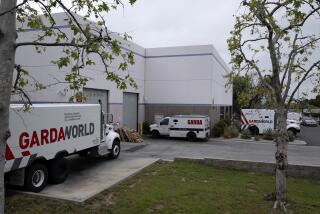Tunnel Serves as Vault to Protect Computer Data
- Share via
VANDALIA, Ohio — After six years of trying to convince companies that their computer data is as good as gold, Secured Data Services Inc. finally can see light at the end of its tunnel.
In this case, the tunnel is a half mile through limestone to a two-acre site 80 feet underground near Lewisburg in southwest Ohio.
Behind motion detectors, video cameras, chain-link fences and a 7-inch-thick vault door are 20,000 computer tapes, disks and cassettes, protected as backups against natural or other disasters, said Steven L. Wright, a consultant.
Many belong to Fortune 500 companies, he said. Others are from area retailers who have found out the hard way that in these days of computerized checkout and inventory, an employee error or sabotage can make backup tapes a lifeblood transfusion.
Secured Data won’t name its clients for security reasons. Likewise, there is no name on the entrance to its cave.
A growing number of such high-security vaults, including one in an old railroad tunnel under New York’s World Trade Center, are catering to companies that realize that a computer without secure backup data is a sitting duck for disaster and possible financial ruin.
“The market is just now beginning to open up. Companies are just now starting to store their records in a coherent fashion,” said Charles C. Johnson, Secured Data’s vice president and general manager.
Johnson, 30, a former Procter & Gamble Co. analytical chemist who was in charge of one of the company’s computer systems, joined Secured Data three years ago when the company was having trouble getting its message across.
Today, sales are doubling every 10 months and are approaching $1 million, he said. Secured Data charges clients from less than $50 per month to more than $8,000, depending on the number of tapes and frequency of access.
Disasters Help Business
The company is aiming at a market within a 120-mile radius that it can serve with four-hour delivery, Johnson said.
“Disaster preparedness at the moment is getting to be a buzzword. We love accountants” who are pushing for it, Wright said.
Recent disasters, such as the First Interstate Bank building fire in Los Angeles, are advertising for the company, he said.
Yet data security services still can be hard to sell, Wright said.
There are still those companies that believe the only backup protection they need is to have an employee take the tapes home in the car trunk.
Competition also is getting tougher, partly from public warehouses converting to offer records storage, Wright said.
Secured Data was founded in 1982 by James M. Valentine, who also owned a foundry and is a co-founder of Cincinnati Microwave.
Valentine, who still has the title of president, has said he got the idea to use part of the 250-acre mine after visiting a similar facility in Montreal.
It took about $300,000 in modifications, including leveling floors, enclosing a 3,500-square-foot vault and a 7,600-square-foot “cold room” that is prewired for a company to bring in its own backup computer.
The temperature is a constant 55 degrees, although heat from the lights and people meant there had to be air conditioning, Wright said. There also is electrostatic dust protection--dust can be as much an enemy to tapes as heat.
The vault is lined with Halon fire extinguishers.
Tape librarian Barbara Clark said there once was a small earthquake in the area “and we didn’t even know it happened down here. . . . If I worry about anything happening down here, it’s the electricity going out,” she said.
It has, once or twice, but with no major problems, Wright said.
More to Read
Inside the business of entertainment
The Wide Shot brings you news, analysis and insights on everything from streaming wars to production — and what it all means for the future.
You may occasionally receive promotional content from the Los Angeles Times.










